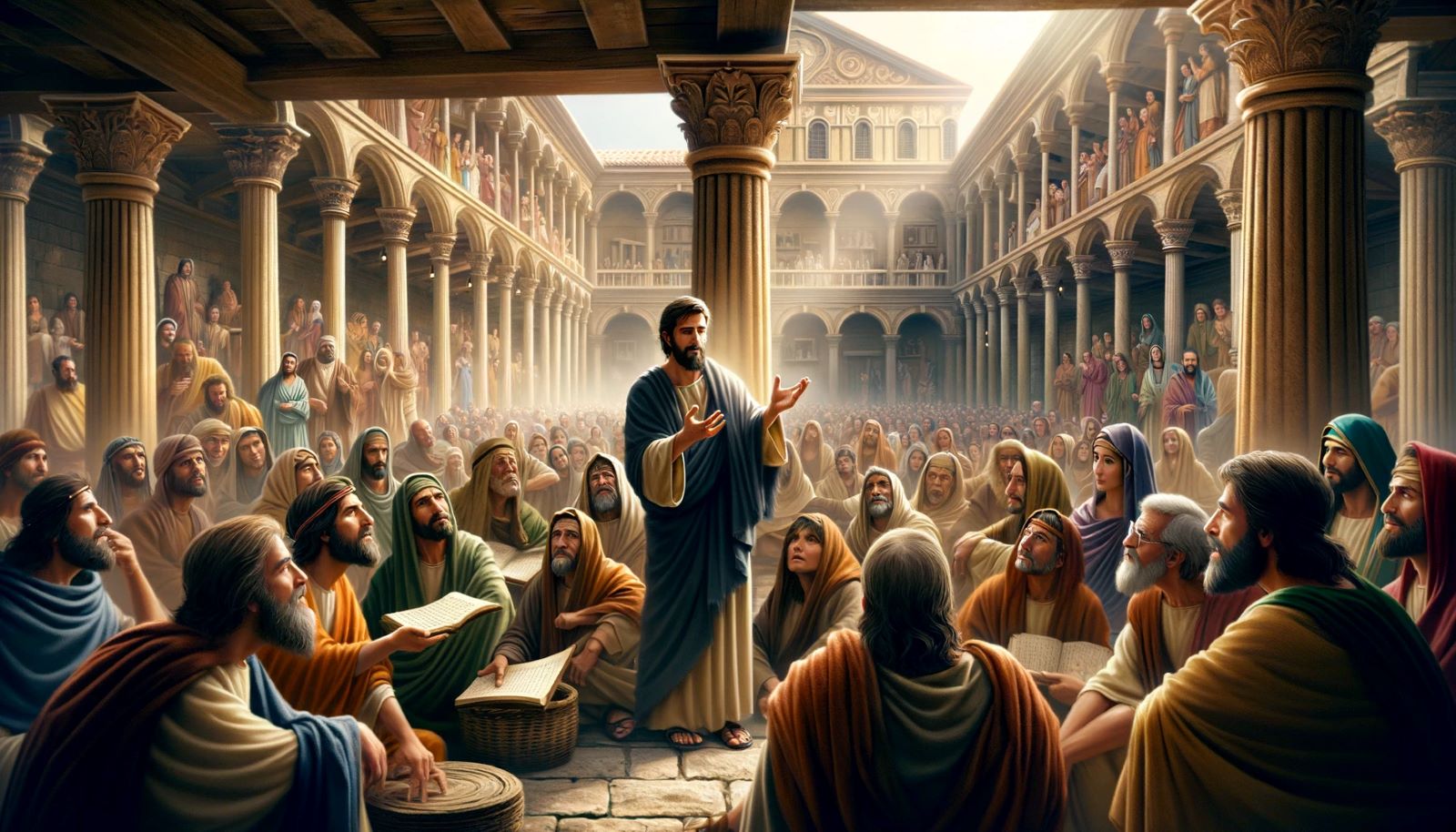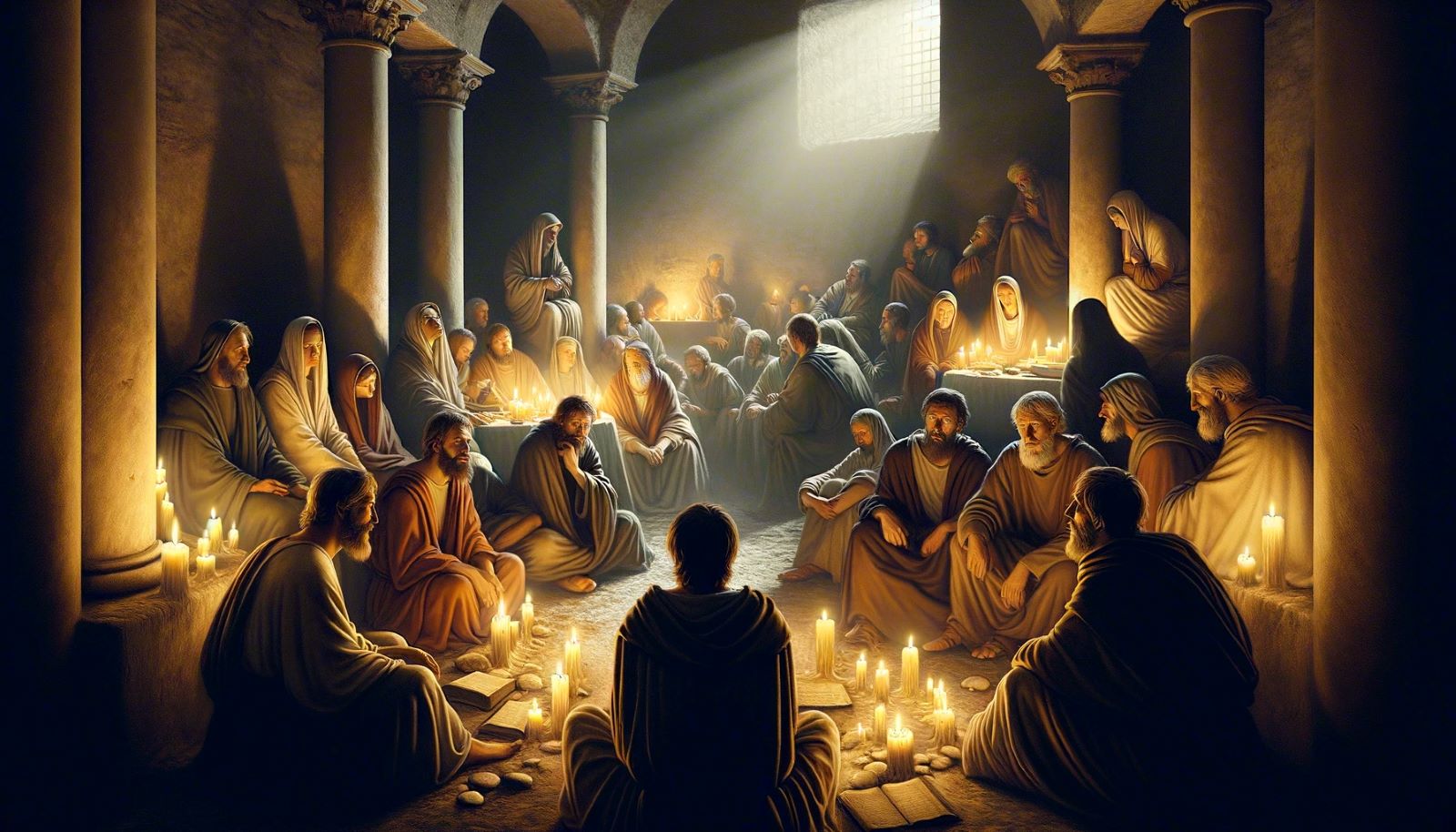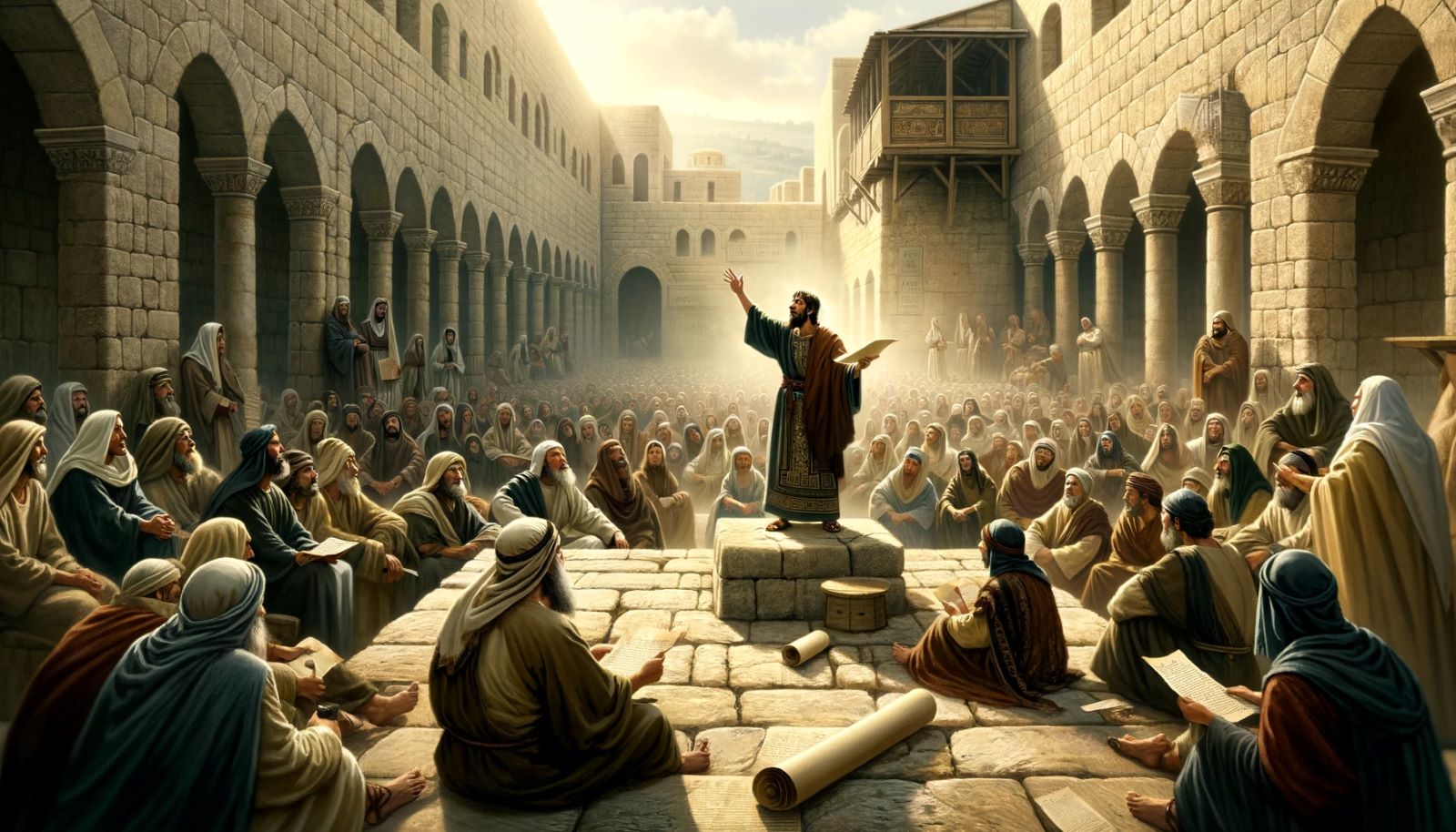Home>Bible Facts>Who Replaced Judas As One Of The 12 Apostles


Bible Facts
Who Replaced Judas As One Of The 12 Apostles
Published: February 18, 2024
Ericka Andersen, an editor at Christian.net, expertly merges digital strategy with content creation, focusing on faith and societal issues. Her communication skills enhance the platform's engaging narratives, fostering meaningful dialogue on belief's impact on society.
Discover the fascinating Bible facts about who replaced Judas as one of the 12 apostles. Uncover the historical and religious significance of this pivotal event.
(Many of the links in this article redirect to a specific reviewed product. Your purchase of these products through affiliate links helps to generate commission for Christian.net, at no extra cost. Learn more)
Table of Contents
Introduction
The story of the replacement of Judas Iscariot as one of the twelve apostles is a fascinating and significant event in the history of Christianity. It is a tale of betrayal, redemption, and the divine selection of a new apostle to fill the void left by Judas. This pivotal moment in the early Christian church holds great theological and historical importance, shedding light on the process of apostolic succession and the guidance of the Holy Spirit.
The events leading up to the replacement of Judas are shrouded in intrigue and tragedy. Judas Iscariot, one of the original twelve apostles chosen by Jesus Christ, infamously betrayed his master for thirty pieces of silver. His act of treachery led to the arrest, trial, and crucifixion of Jesus, fulfilling the prophecies and setting in motion the sequence of events that would ultimately lead to the establishment of Christianity.
Following the crucifixion and resurrection of Jesus, the remaining eleven apostles were faced with the daunting task of filling the vacancy left by Judas. This crucial decision would have far-reaching implications for the future of the Christian movement, as the twelve apostles held a central role in spreading the teachings of Jesus and laying the foundation for the early church.
The selection of a replacement for Judas was not taken lightly, as the apostles understood the weight of their decision and the need for divine guidance. The process of choosing a new apostle was guided by prayer, reflection on the scriptures, and the discernment of the Holy Spirit. The outcome of this process would not only address the immediate need for a twelfth apostle but also set a precedent for the future leadership and succession within the Christian community.
The story of the replacement of Judas as one of the twelve apostles is a testament to the resilience and faith of the early Christian church. It serves as a reminder of the enduring impact of betrayal and the redemptive power of divine intervention. The selection of Matthias as the twelfth apostle would set the stage for the continued spread of the gospel and the establishment of the Christian church, marking a pivotal moment in the history of Christianity.
Read more: Who Are The Apostles Of Today
The Betrayal of Judas
The betrayal of Judas Iscariot stands as one of the most infamous acts of treachery in religious history. Judas, one of the twelve chosen apostles of Jesus Christ, ultimately succumbed to the temptation of betrayal. The Gospel of Matthew recounts how Judas agreed to hand over Jesus to the religious authorities in exchange for thirty pieces of silver, marking the beginning of a chain of events that would lead to the crucifixion of Jesus.
Judas' betrayal unfolded during the final days of Jesus' earthly ministry. As Jesus gathered with his disciples for the Last Supper, he revealed that one among them would betray him. This revelation deeply troubled the disciples, and each one questioned whether they could be the betrayer. Jesus, however, identified Judas as the one who would betray him, fulfilling the scriptures.
Following the Last Supper, Judas led a group of soldiers and religious leaders to the Garden of Gethsemane, where he identified Jesus with a kiss, signaling his betrayal. This act of betrayal set in motion the arrest, trial, and crucifixion of Jesus, ultimately leading to his sacrificial death and resurrection.
The betrayal of Judas serves as a poignant reminder of the complexities of human nature and the frailty of human loyalty. It also fulfills the prophecies foretold in the scriptures, underscoring the divine orchestration of events leading to the fulfillment of God's plan for salvation.
The story of Judas' betrayal is a sobering and cautionary tale, highlighting the enduring consequences of betrayal and the profound impact of individual choices. It also sets the stage for the subsequent events that would lead to the selection of Matthias as the replacement for Judas among the twelve apostles, marking a pivotal moment in the early Christian church.
The betrayal of Judas stands as a testament to the timeless themes of human frailty, divine sovereignty, and the redemptive power of God's plan, serving as a foundational element in the narrative of Jesus' crucifixion and the subsequent establishment of the Christian faith.
The Selection of Matthias
Following the betrayal of Judas Iscariot and the subsequent crucifixion and resurrection of Jesus Christ, the remaining eleven apostles faced the critical task of filling the vacancy left by Judas. The need to maintain the symbolic number of twelve apostles, representing the twelve tribes of Israel, was deeply rooted in the tradition and significance of the early Christian community.
The selection of a replacement for Judas was not a decision to be made lightly. The apostles recognized the gravity of their task and the need for divine guidance in choosing a worthy candidate to join their ranks. In the Acts of the Apostles, the process of selecting a new apostle is described as a deliberate and prayerful undertaking.
Peter, the outspoken and influential apostle, took the lead in addressing the issue of Judas' vacancy. He stood before the assembled believers and emphasized the fulfillment of the scriptures that foretold Judas' betrayal and subsequent vacancy among the apostles. Peter articulated the criteria for the selection, emphasizing the necessity for the chosen candidate to have been a witness to Jesus' ministry from his baptism by John the Baptist to his ascension.
The assembly, consisting of about 120 believers, then proposed two men who met the qualifications: Joseph called Barsabbas (also known as Justus) and Matthias. After presenting the two candidates, the assembly engaged in a solemn process of prayer, seeking the guidance of the Holy Spirit in making the final decision. This act of prayerful discernment underscored the apostles' reliance on divine wisdom in matters of leadership and succession within the early Christian community.
Ultimately, the assembly cast lots to determine the chosen candidate, and Matthias was selected to fill the vacant position among the twelve apostles. The casting of lots was a common method used in ancient times to seek divine guidance and make important decisions. In this instance, it was employed as a means of affirming God's sovereign choice in the selection of Matthias as the twelfth apostle.
The selection of Matthias as the replacement for Judas solidified the symbolic and organizational structure of the twelve apostles, ensuring the continuity and legitimacy of their collective leadership. This pivotal decision set the stage for the ongoing mission of spreading the gospel and establishing the early Christian church, laying the groundwork for the enduring legacy of the apostolic ministry.
The process of selecting Matthias as the twelfth apostle exemplifies the early Christian community's commitment to seeking divine guidance and upholding the principles of faithful stewardship and leadership succession. It also highlights the significance of prayer, discernment, and reliance on the Holy Spirit in making crucial decisions within the church.
The selection of Matthias as the twelfth apostle stands as a testament to the early church's unwavering dedication to maintaining the integrity and continuity of the apostolic ministry, ensuring the preservation and propagation of the teachings of Jesus Christ to future generations.
The Role of Matthias as an Apostle
Matthias, the chosen replacement for Judas Iscariot among the twelve apostles, assumed a significant role in the early Christian church, contributing to the propagation of the gospel and the establishment of the apostolic ministry. As the twelfth apostle, Matthias embraced the responsibilities and privileges associated with this esteemed position, playing a pivotal role in shaping the trajectory of the burgeoning Christian movement.
Matthias' role as an apostle was characterized by unwavering dedication to the teachings of Jesus Christ and the mission of spreading the gospel to diverse regions. Alongside the other apostles, Matthias actively participated in proclaiming the message of salvation, performing miracles, and nurturing the growing community of believers. His presence among the twelve apostles symbolized the continuity and unity of the apostolic leadership, reinforcing the foundational principles of the Christian faith.
As an apostle, Matthias played a crucial role in the early church's decision-making processes and the establishment of doctrinal foundations. His firsthand witness to the ministry, death, and resurrection of Jesus Christ endowed him with a unique authority and credibility in conveying the message of redemption and reconciliation. Matthias' contributions to the collective leadership of the apostles enriched the diverse perspectives and experiences that shaped the early Christian community.
Matthias' apostolic ministry extended beyond the immediate circle of believers, as he embarked on missions to various regions, sharing the transformative message of the gospel and establishing communities of faith. His commitment to spreading the teachings of Jesus Christ reflected the apostles' collective mandate to make disciples of all nations, laying the groundwork for the global expansion of the Christian faith.
The selection of Matthias as the twelfth apostle affirmed the continuity of the apostolic lineage and the divine orchestration of leadership succession within the early Christian church. His steadfast commitment to the apostolic mission and unwavering faith in the message of salvation exemplified the qualities of resilience, courage, and devotion that characterized the early apostles.
Matthias' role as an apostle stands as a testament to the enduring impact of his contributions to the early Christian church, shaping the foundation of the apostolic ministry and laying the groundwork for the continued spread of the gospel. His legacy as the twelfth apostle serves as a reminder of the pivotal role played by the apostles in establishing the Christian faith and perpetuating the transformative message of Jesus Christ to future generations.
Conclusion
The replacement of Judas Iscariot as one of the twelve apostles by the selection of Matthias stands as a pivotal moment in the early Christian church, encapsulating themes of betrayal, redemption, divine guidance, and the continuity of the apostolic ministry. The events leading to the selection of Matthias underscore the profound theological and historical significance of this transition within the leadership of the apostles.
The betrayal of Judas Iscariot, culminating in his infamous act of treachery against Jesus Christ, serves as a poignant reminder of the complexities of human nature and the enduring consequences of betrayal. Judas' betrayal, while a tragic and disheartening episode, ultimately set in motion a sequence of events that would lead to the fulfillment of divine prophecies and the redemptive sacrifice of Jesus Christ.
The selection of Matthias as the replacement for Judas among the twelve apostles exemplifies the early Christian community's commitment to seeking divine guidance and upholding the principles of faithful stewardship and leadership succession. The deliberate and prayerful process of selecting Matthias, guided by the discernment of the Holy Spirit, underscores the apostles' reliance on divine wisdom in matters of leadership and the continuity of the apostolic ministry.
Matthias' role as an apostle was characterized by unwavering dedication to the teachings of Jesus Christ and the mission of spreading the gospel to diverse regions. His presence among the twelve apostles symbolized the continuity and unity of the apostolic leadership, reinforcing the foundational principles of the Christian faith. Matthias' contributions to the collective leadership of the apostles enriched the diverse perspectives and experiences that shaped the early Christian community.
The selection of Matthias as the twelfth apostle affirmed the continuity of the apostolic lineage and the divine orchestration of leadership succession within the early Christian church. His steadfast commitment to the apostolic mission and unwavering faith in the message of salvation exemplified the qualities of resilience, courage, and devotion that characterized the early apostles.
In conclusion, the replacement of Judas by Matthias as one of the twelve apostles serves as a testament to the enduring impact of divine guidance, the redemptive narrative of betrayal and restoration, and the foundational role of the apostles in shaping the early Christian church. The selection of Matthias solidified the continuity and legitimacy of the apostolic ministry, ensuring the preservation and propagation of the teachings of Jesus Christ to future generations.















